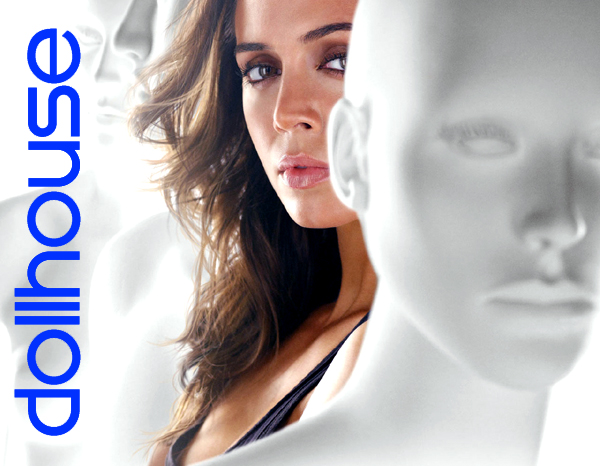
While in a loopy haze brought on by Hydrocodone (you don’t want to know), I pour through Joss Whedon’s latest television offering of female empowerment lectures, form of the morality-based, sci-fi actioner, Dollhouse: Season One (Don’t worry, I like this show. Promise).
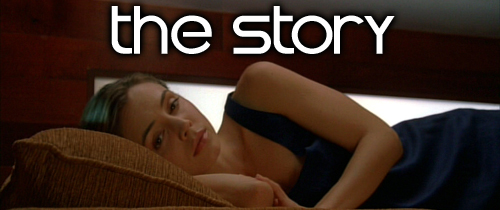
WARNING: Contains Major Spoilers!
The Dollhouse is a secret, underground facility (quite literally) that seems to specialize in providing the rich and powerful with a variety of services, usually morally questionable or highly illegal. Sometimes both. These “engagements” are performed by programmable people, called “dolls” or “actives”. Through Matrix-style technobabble, skills, memories and entire personalities are uploaded into the “blank slates”, so they can carry out a number of required needs, from a Hostage Negotiator, to a Dominatrix, to a quick-thinking Detective, to your basic Dream Date.
During the initial 12 episodes in the first season, we follow an ensemble of layered characters from both sides of the issue, namely those who work and live within the Dollhouse and those on the outside trying to bring it down. Very often, these elements are intertwined. At the center, there is Caroline, played by Eliza Dushku (Buffy the Vampire Slayer, Bring It On, Tru Calling). Distraught and in trouble with the law, her desperation leads her to “hideout” in the Dollhouse. Signing over the next five years of her life, Caroline’s mind is wiped and she becomes Echo.
The Dollhouse is something of an urban myth in Los Angeles at this point. Nevertheless, chasing down proof with dogged determination is FBI Agent Paul Ballard, played by Tahmoh Penikett (Cold Squad, Smallville, Battlestar Galactica). Though he is mocked by his peers and dismissed by his supervisors, Paul makes the Dollhouse his obsession at the risk of both his personal and professional life.
The story is certainly much thicker, with characters I haven’t even mentioned, but I won’t touch on them here. Better to leave such rich, diverse goodness to be discovered on DVD. What is worth noting is how this all came about. Having previously been burned by the sometimes harsh, sabotaging brutality of network television, Joss Whedon wasn’t looking to go back to that medium anytime soon. During lunch with Eliza Dushku, he listened to her lamentation as an actress having trouble getting juicy roles and having to put on so many different personalities for other people, while trying to keep a strong sense of self and high spirits.
With Eliza’s producing deal with Fox, and a desire to work with her and his writing buddies again, Joss began baking what is now known as Dollhouse. It’s a rumination on need versus want, human trafficking and maintaining one’s identity. The “medicine” here is wrapped up in a rather tasty bowl of commercially viable, action-intensive ice cream. Mostly, it all goes down relatively smoothly, leaving the audience full and satisfied. Sometimes, the ice cream melts away and leaves things a little too chalky and sour, but more on that later.
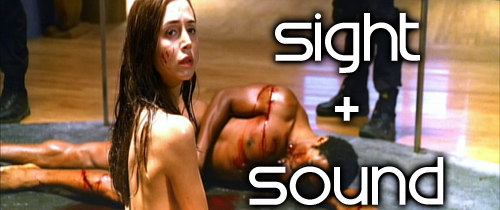
There are times in this standard DVD set when the picture looks rather nice. Blacks are always deep, colors are generally well separated and detail is clean and evident. Unfortunately, probably due to some poor, quick over-compression artifacts, the image can also look grainy, soft and muddy in a given scene or shot. The struggle is constant. Some episodes fare better than others. A Spy in The House of Love looks pretty strong throughout.
The 5.1 Dolby Surround Mix is impressive and manages to spread out dialogue, music and sound effects evenly. The fight scenes scattered throughout the series sound especially painful, but in a good way. In an episode in the middle of the season, a character gets their neck crushed up against the edge of a coffee table. The crunching sound snapping bone is both satisfying and unsettling.
No matter how many times I hear it, the music box closer to Jonatha Brooke’s theme always makes me smile in that delightfully eerie way. Series composers Mychael Danna and Rob Simonsen (8, Management, 500 Days of Summer) provide the show with a unique blend of contemporary and classical arrangements. The piano work in The Target, and the electric guitar motif in Epitaph One are good standouts to illustrate the range within the score.
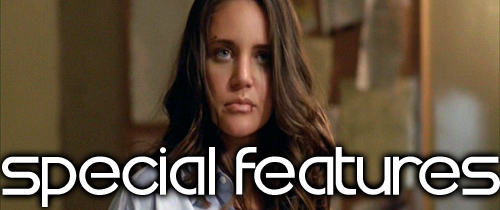
Like many Whedon fans, I felt that three audio commentaries out of essentially 14 episodes worth of content was kind of frustrating and disappointing. Such wasted opportunity makes me appreciate shows like Eureka and Battlestar Galactica, where creators and cast will provide podcast commentaries (sometimes twice for the same episode), whether it’s for the web or the DVDs themselves. Furthermore, what about The Simpsons, which manages to contain roundtable recordings for every single episode on the DVD? If done right, it only requires a couple dozen megs of available space per hour. On a dual layer disc with 7.4 gigs of storage, that’s hardly a dent.
To remedy this oversight, I like to record my own commentaries for fun, sometimes even with a real, live writer from a show! Shameless plug, I know, but don’t forget I’m also plugging Tim Minear….Um, you couldn’t have read that more wrong….ANYWAY, on this set you’ll first find Joss and Eliza talking about the “pilot”, Ghost. Though not as deep and insightful as Whedon’s other commentaries, this one is full of friendly banter and hearty laughs. Eliza kills a bowl of strawberries and shares what it’s like taking on her new role as Producer, while Joss throws out lots of self-deprecating humor and rare, exclusive musings from his talky tummy as this was recorded early in the day, sans breakfast.
The second commentary is a solo effort from Joss, bringing us his patented, long-form reflections on writing, Man On The Street. While generally thought provoking and never at a loss for words, depending on one’s mood at the time, these term paper commentaries can be either fascinating or trance-inducing. Admittedly, I had to listen a couple more times to catch everything, as I zoned out once or twice. Maybe that should be considered a good thing. Your mileage may vary.
The third and final commentary comes courtesy of Jed Whedon and Maurissa Tancharoen, who are so obviously in love, you can actually hear the flutter of little cartoon hearts on their track. Then again, perhaps it’s these pain meds I’m on. Moving along, the happy couple discusses the thirteenth “lost” episode, Epitaph One. The commentary is funny and informative, but the participants mumble and trail off too much, so you may want to plug in some headphones.
Which brings us to the single, Supplemental disc in this 4-disc set. In addition to Epitaph One, we also get the original, (mostly) unaired pilot, Echo, not to be confused with Echoes located on disc two (It’s Firefly and Serenity all over again). More on both of those further down the page. Rounding out this disc is no more than five featurettes, including Making Dollhouse, Coming Home, Finding Echo, Designing the Perfect Dollhouse and A Private Engagement. These segments are relatively extensive and include interviews from all manner of cast and crew. The topics of discussion range from the show’s conception and motivation, Joss Whedon’s return to network television and the production’s epic set design, complete with a video tour. The last one, my favorite, is just a fun question posed to the crew about what kind of skills they would want to be imprinted with and who they think might be a doll among them. Tim Minear’s dismissive, uppity responses are particularly amusing.
There are a wealth of deleted scenes to choose from on this DVD. The “Play All” function is a godsend. Most of these snippets are inconsequential and it’s obvious why they were trimmed. Having said that, there are a couple of scenes for Omega that are quite telling and incredibly crucial pieces of information. After watching the episodes, it would be wise to immediately navigate to the omitted material on this disc. It clears up a lot of confusion and gives the episode a cleaner narrative. The only thing missing from this bonus disc is the music video for Jonatha Brooke’s “What You Don’t Know”. Aside from that minor nitpick, it’s fairly packed with goodies.
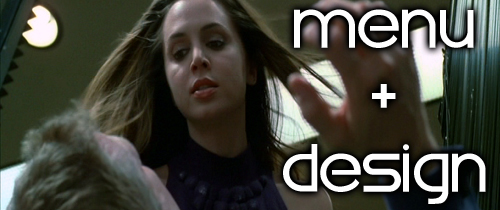
The menus are mostly as expected for a Joss Whedon production on DVD. Some appetizing, random video footage, looped with the show’s theme. There’s nothing inherently bad about the menus for Dollhouse, there’s just nothing special about them, either. While easy to read and navigate through, the dissolved splash of faces and shots feel kind of thrown together. They’re just sort of there. Something utilizing the visuals of the memory-wipe motif would have been much more interesting, but I digress. It serves its purpose.
The package design is far more eye-catching. I happen to have a limited edition set exclusive to Comic Con (numbered 003729, not that you asked), so I can only describe what I have in front of me, not the standard set found in most retail stores. The only discernible difference, near as I can tell? A letter of thanks from Joss and the title on the box has now gone from basic black to a shiny, embossed blue. Also, the box has a cardboard replication of the same artwork underneath, adhered to the case, presumably for autograph accommodations at Comic Con. Unfortunately, due to the self-sabotaging skills of the Fox Gremlins (be afraid, for they are very real and made of destruction and pain) and their severe underestimation of Joss Whedon and Eliza Dushku’s fan base, I was not able to get my copy signed.
Still, the packaging here is quite “shiny”, impersonal signatures be damned. The clear plastic case is a nice, clean standout from the usual fare. It’s also sturdy and durable, unlike the near-glass fragility of say, Buffy the Vampire Slayer: The Chosen Collection (grr arrgh, indeed). Inside, the four discs are housed in a rather unique and accessible way. Two “pages” of plastic hold a single disc on either side, slightly fanned out from one another. This way, the discs aren’t actually touching each other, so you don’t have to worry about scratching them when reaching for your favorite batch of episodes.
I’m almost positive that were you to remove the face card with the shiny title, Joss’s letter and the sticker on the back of the box with the unit numbers, you would be left with the exact same thing you can get at the store. Oh well, better to press on and be thankful for the extra “special” bits, shallow ornamentation though they may be. For example, Joss Whedon’s note on the inside comes in the form of a clear, plastic sheet. The text is in boldfaced lettering, almost superimposed onto the card which faintly shows the same image of Eliza and her “Dolls” as is on the front cover of the case. Due to the ridges on the face of the card, if you angle it a certain way, the image and text disappear. They’ve been “wiped” from the slate, you see. It’s not so practical as it’s sometimes difficult to read, but it is cool. Not just cool, but “kewl”. The letter reads as follows:
“People often joke about wanting to be able to tour my brain. Oddly enough, I don’t hear that as much anymore. Because this show is part of the tour – maybe the part that’s roped off, that you slip into when the docent is pointing to something else (“And on your left, the Beloved-Character-Killing Room”). The part that no one wants to talk about.
I am a monster.
I am also a terrified young girl making her way through the dark, trying to find an answer, an exit, an identity. I’m a capricious and self-satisfied programmer, a ruthless and terribly vulnerable boss, and a scarred, lonely healer who cannot come out of the dark.
And this show is all about the dark; I was out of superhero land and into a world of the helpless and the corrupt. It kept me up nights, thinking of the tightrope I was going to start walking. But in the end it drew me in, almost the way it draws the noble FBI agent who just wants to help a woman free herself – ’cause I’m him too. We all live in the Dollhouse. We all play there. We’re all abusers, victims, kind, callous… cobbling our own narratives about who we are and what we want. We are programmed. We are programmers. With all my heart I believe this, and with the most extraordinary star, staff and cast imaginable I have begun to speak of it. Watch, and you’ll see what a dim view I take of humanity. And how hard I love it.
Welcome to the Dollhouse.
Joss Whedon”
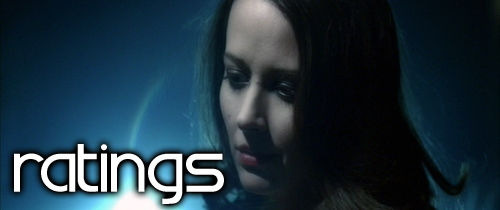
GHOST: **1/2.
While certainly entertaining and engaging, much of this feels too pandering, dumbed down and shallow to me. Regardless, it’s still tightly paced, the performances are strong and it does leave one ready to get deeper into the material and keep going.
THE TARGET: ***1/2.
A fascinating game of gender-specific cat and mouse. Visceral and quite cinematic in execution. The episode also weaves in a nice flashback narrative, similar to Firefly’s “Out Of Gas”. There’s also a commanding performance by Matt Keeslar (Psycho Beach Party, Splendor, The Middleman).
STAGE FRIGHT: *.
A severe drop in quality. Noticeable padding. An uninteresting and cliched, “poor little rich girl” kind of central character. Plot threads that are brought up and then abandoned. Clumsy, telegraphed and lacking in any sort of grace or subtlety. If nothing else, at least there’s someone getting knocked out with a folding chair and Eliza Dushku’s rather impressive singing talents on display.
GRAY HOUR: ***.
This episode, while still dealing with recurring plot threads of the series, mostly works as its own sort of minimalist story. A strong imprint character, an effective engagement and a tight, fun script all around make this one a keeper. Plus, who doesn’t love a good heist movie, particularly one where everything goes wrong?
TRUE BELIEVER: ***1/2.
While filling a quota for a certain episode type rather nicely, this one is especially strong because it’s the first to truly justify the need for an Active and the services of the Dollhouse. Additionally, Eliza Dushku gives a quiet, nuanced performance that carries the story. Brian Bloom is also very memorable. Some of the more immobile elements of the over-arching plots are really picking up steam here as well.
MAN ON THE STREET: ****.
Patton Oswalt is Emmy-worthy here, and practically steals the entire episode away from everyone else, even when he’s not onscreen. Additionally, Eliza Dushku does a nice job of moving seamlessly through playing different characters within such a small time span. The action is brutal, the dialogue is thought provoking and also heartbreaking at times. A standout offering with a wickedly satisfying twist near the end.
ECHOES: ***.
While quite funny at times, and brimming with important character revelations, the whole isn’t as strong as the sum of its parts. Not as satisfying as it could have been. Outside of that, Reed Diamond is a blast to watch in this episode. Though slightly derivative of Buffy fan favorite “Band Candy”, this idea is still just as fun.
NEEDS: **1/2.
There are good performances from all involved and a couple of pleasing character developments. However, some things are a bit predictable and the episode meanders for too long to get to the point at the end. Although it’s a well made point, I’m not sure it’s entirely well earned.
A SPY IN THE HOUSE OF LOVE: ****.
Much like “The Target”, the visuals in this episode elevate it to something more cinematic. Granted, we’re essentially treated to “Reservoir Dolls” (right down to the character specific narrative structure and title cards), but it’s never boring. Interwoven within the main plot of finding the Mole, we get a nice subplot featuring Olivia Williams in a revealing, sympathetic performance.
HAUNTED: ***.
Though the murder mystery element is enticing and well done, it’s difficult to get much invested in a character who we only know after she’s been killed and imprinted into Eliza Dushku. The idea of using an Active this way is intriguing, but this standalone episode feels like a distraction and would have played better in the first half of the season. The best bits come from Eliza’s performance and a much more interesting subplot featuring solid work from Dichen Lachman.
BRIAR ROSE: ****.
Not only does this episode follow a well constructed fairy tale theme, it contains an award worthy performance by Firefly’s own, Alan Tudyk. The script is sharp and the pacing brisk, but the real reason to watch is for Alan’s flawless double play as a neurotic stoner and a schizophrenic, calculating psychopath.
OMEGA: ***1/2.
Eliza Dushku does powerful work here, having built up to this moment all season. Both her and Alan Tudyk are firing on all cylinders in their scenes together, which feels like a good, one act play in and of itself. Unfortunately, a couple of missteps prevent this one from achieving highest marks. There are a few glaring editing problems that completely destroy a small subplot and results in an anticlimactic ending. Luckily, the deleted scenes on disc 4 can help, but they belong here. Also, a line or two took me out of the story, causing me to groan as I felt I was sitting in the choir, being preached to. All in all, it was still a worthwhile episode.
ECHO: ***.
Most folks seem to have trouble watching this original pilot with fresh eyes, but it can be done. Objectively, it’s not a great pilot, but it’s at least more thoughtful and mysterious than its shallow counterpart. I was expecting something vastly abstract and alienating but in fact, there’s no reason why this couldn’t have worked as a lead in for this series. Most importantly, this one doesn’t spend far too much time hitting you over the head with exposition. At the end of the day, both pilots work just fine (due in large part to the fact that they contain much of the same footage). It really comes down to personal preference. To each their own.
EPITAPH ONE: **.
I have mixed feelings about all aspects of this pseudo finale of sorts. The video aesthetic is too dark, noisy, bland and tired. Much of the dialogue is distracting, indulgent and too self aware. I also feel that it was too soon to jump ahead like this. On the flip side, the structure of the script and the events that occur in the episode itself are consistently twisty and entertaining. The general idea of the story and how it plays out is especially satisfying. Not to mention, the performances are spectacular all across the board, particularly Felicia Day and Fran Kranz. Weighing those various pros and cons, I decided to split down the middle to a fair and average grade.
OVERALL RATING: *** out of 4.
“The needs of the story have to come above my political beliefs. I can’t build every story around my idea of what ought to be.”
Joss Whedon says these words in his commentary on disc two, though some of his work up to this point would seem to indicate, this is a new lesson he’s just now learning. That’s not a criticism, but merely an observation. On occasion, never more so than in Buffy and Dollhouse, his agenda and message sometimes gets in the way of the plot or a character’s true voice. A message of equality is a great and noble message to share, but a little goes a long way.
Having said that, Dollhouse is mostly a good show with profound ideas about identity; how we see others, how others see us and how we see ourselves. It’s something I think we can all relate to. Female empowerment by its very title is a gender specific subject. After seven seasons of Buffy (and then some), I’m ready to explore the soul and the psyche with a wider net. With the right care and focus, Dollhouse is definitely the show to do that, which makes me very hopeful and excited for season two.
I’m looking forward to a more diverse group of clients and engagements next season. Let’s mix it up, Joss. Give Eliza more to do. She’s been pretty much rocking it with whatever’s thrown at her (at least, by my standards). I’ve got my Mag flashlight and I’m ready to go into any room you want to lead me to. Bring on the darkness. I dare you.